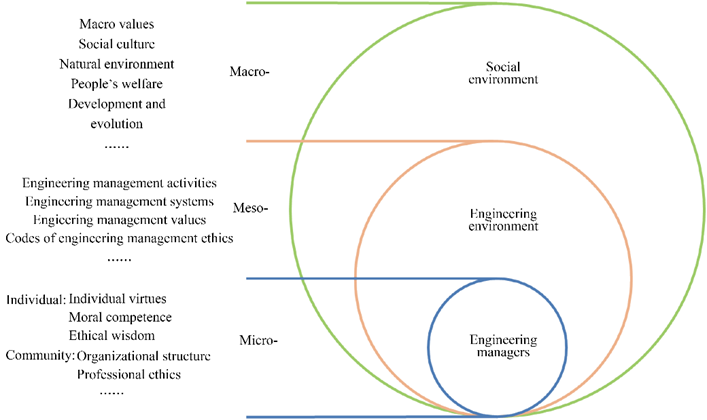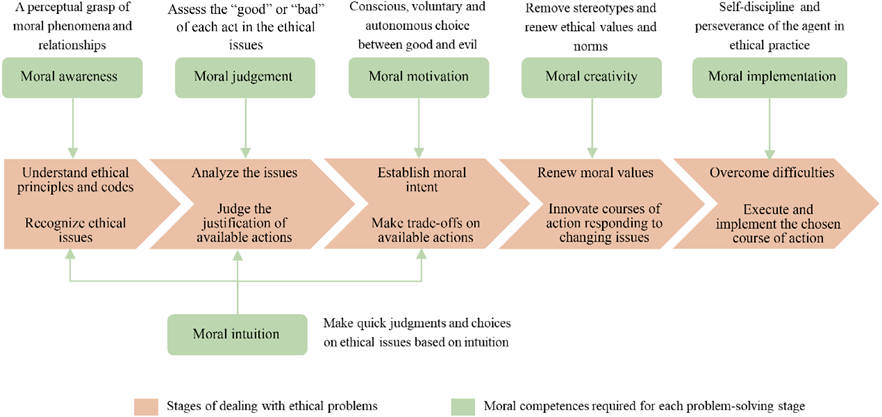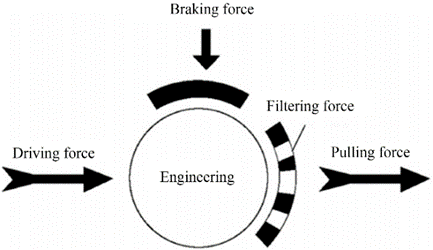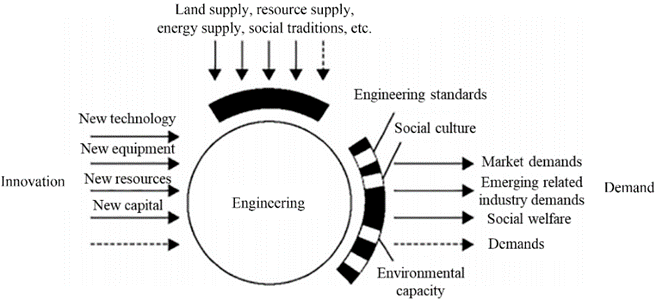《1 Introduction》
1 Introduction
Engineering is an integrated activity of creating or changing the character of things using science and technology and organizing resources, in order to survive, develop, and realize specific goals [1]. Since the launch of reform and opening up, China has realized significant achievements in engineering construction. However, with the increasing impact of modern engineering on the economy, society, and environment, certain problems have become increasingly prominent. For example, engineering accidents cause significant harm to human life and health; engineering corruption destroys engineering justice and sows the potential for accidents. Land development of certain engineering projects destroys regional, cultural, and historical relics, which is not conducive to cultural diversity; social conflicts due to large-scale engineering projects occur sometimes, and they can lead to economic losses and adverse social impacts. Furthermore, some engineering projects lead to environmental pollution, which aggravates ecological deterioration and harms human welfare. The negative impacts of these engineering problems are not only local, but also universal and global; not temporary, but accumulative; and affect the present and sustainable development. Solving these engineering problems has become a serious challenge for China’s engineering management and has led to significant difficulties for engineering practitioners, particularly for managers and engineers.
The essence of these engineering problems is ethical, concerning the complex value ranking and interest coordination between humans and humans, between humans and engineering, and between humans and nature. Insufficient safety input and the absence of safety measures are the important causes of engineering accidents, which are primarily due to the ethical choices of engineering managers essentially emphasizing economic benefits over life value. Engineering corruption is closely related to engineering managers seeking private benefits at the expense of collective interest and failing to fulfill their ethical responsibilities. The conflict between engineering construction and protection of cultural relics is essentially an ethical conflict between economic benefits and cultural values. The emergence of social conflicts involve an imbalance in justice due to the unreasonable distribution of interests. Furthermore, engineering pollution can be considered as the result of improper weighing of economic and ecological benefits, which is also related the problem of intergenerational equity in development. Ethical elements are deeply permeated into other elements of engineering activities [2]. Incorrect ethical choices in engineering management can lead to project deviation, which poses a challenge to the ethical performance of engineering management.
As an activity of construction based on the integration of scientific laws and technology, engineering involves direct productivity [3]. Therefore, while shaping the cultural concept and guarantee mechanism of science and technology for social good [4], engineering for social good is also required, in order to implement the “good” science and technology into “good” practice. However, current ethical performance of engineering management in China lags behind the requirements of engineering construction development, which has become an important factor hindering the high-quality development of Chinese engineering in the new era. This is reflected primarily in the weak ethical awareness, insufficient moral competences, and lack of experience in dealing with ethical issues among engineering managers in general, and most importantly, the mismatch between the existing engineering management ideas and requirements of engineering development in the new era. For example, the emphasis on economic benefits at the expense of safety contradicts the development philosophy of people-centeredness and security, the exchange of environmental damage for engineering benefits conflicts with the development philosophy of sustainability and green, and the neglect of the appeal of those whose interests are impaired in engineering is inconsistent with the development philosophy of fairness, justice, and sharing. Under the new development philosophy, promotion of the renewal of engineering management ethics principles and improvement of engineering management ethical performance are the key to solving periodical ethical problems in the field of engineering construction in China.
In the 21st century, the Chinese theoretical system of engineering philosophy [3] has been developed, and the theoretical system of engineering management has been gradually improved [5]; however, the ethical issues in engineering still require a more comprehensive and an in-depth discussion. The development of engineering ethics in China should reflect the current trends and respond to the needs of socioeconomic and engineering development. Thus, theoretical ideas must be enriched, research methods must be updated, and working approaches must be improved through multidisciplinary collaboration with engineering technology, engineering management, and engineering philosophy. These can help explore theoretical paths and practical measures that can interpret and solve newly emerged ethical problems, and deal with the ethical challenges in the field of engineering construction in the new era.
Therefore, the theoretical system of engineering ethics must be innovated, ethical performance of engineering management must be improved, and engineering managers must be promoted to cultivate virtues required by their positions. These are responses to the exigent demand for solving the ethical problems in China’s engineering practice in the new era, the important path to enrichment and improvement of Chinese engineering philosophy theories, and the direction of the times to promote good and high-quality development of engineering.
《2 Significance of research on engineering management ethics in the new era》
2 Significance of research on engineering management ethics in the new era
《2.1 Limitations in the development and application of engineering ethics in China in the new era》
2.1 Limitations in the development and application of engineering ethics in China in the new era
Western engineering ethics originated in the 1970s and have comparatively matured in the United States, Europe, and other developed countries and regions. Engineering ethics was introduced later in China, and China essentially inherited the Western research framework. Essentially, it starts from engineers’ professional ethics with case studies, focusing primarily on ethical issues and choices faced by engineers in their professional practice. Additionally, it addresses the problem of how codes of engineering ethics should be applied to specific real-life situations to ensure that engineers’ decisions and behaviors conform to the requirements of ethical principles [6]. However, the existing theories and codes of engineering ethics are not appropriate for application in China’s engineering practice and provide inadequate guidance for resolving ethical problems.
The fundamental reason for the limitations in the development and application of engineering ethics in China is believed to be the mismatch between engineering ethics theories and the core ethical agents in China’s engineering practice.
In engineering ethics, engineers are the core agents, and the conflict between their professional and ethical responsibilities is the focal point. Essentially, engineering codes of conduct require engineers to act as loyal agents of their employers; further, it also requires them to place the safety, health, and welfare of the public first [7]. Engineers find themselves in an ethical dilemma when decisions of the company they are employed in can endanger public safety, health, or welfare. Codes of engineering ethics expect engineers to act in professional conscience and as whistle-blowers when the public good is seriously threatened and reports to managers are not satisfactorily received [8]. This ethical dilemma is essentially due to the mismatch between the decision-making power provided to engineers and the ethical responsibilities required of them. Therefore, it should be resolved by external forces, where the assumption of engineers’ ethical responsibilities implies confrontation and “resistance” with employers (corporate managers) and sacrifices by themselves. This is a difficult decision even in Western countries, where the engineering profession is highly autonomous. China’s professional engineering associations are less professionalized, and its engineers are less influential compared with Western engineers. Additionally, assuming the primary ethical responsibility for engineering decisions involving social and environmental impact is even more challenging for engineers when their task is largely to agree with their managers’ decisions and they have little professional autonomy [9]. The mismatch between the high requirement of engineers’ responsibility from codes of engineering ethics and the low level of engineers’ influence in China’s practice makes engineering ethics inapplicable to China. Therefore, the development of engineering ethics in China in this new era requires a shift in its core ethical agent.
《2.2 Toward engineering management ethics—an effective way to solve engineering problems in China》
2.2 Toward engineering management ethics—an effective way to solve engineering problems in China
Focusing ethical agents on engineers alone has certain limitations. It has been indicated that studying only engineers’ individual ethical behavior is one-sided, and the ethical roles and decision-making involvement of other engineering participants should be explored [10]. It has also been mentioned that in addition to engineers’ professional ethics in a narrow sense, Chinese scholars should bring ethical issues concerning other members of the engineering community [11] — managers, investors, workers, and other stakeholders — into the research horizon of engineering ethics [12]. Therefore, based on China’s engineering practices and realities, we believe that the core ethical agent should shift to an engineering practitioner with greater power — the engineering manager — which is necessary and effective with its theoretical basis and practical needs in China’s engineering practice.
First, engineering managers are at the core of engineering decision-making. Decision-making is a key part of engineering activities, and “who has the power to make decisions” and “what procedures should be followed to make decisions” are the keys to decision-making [13]. Engineering managers are in the driver’s seat in engineering decision-making and often have a final say. Additionally, the leadership position of engineering managers facilitates the integration of team resources, improvement of cognizance of the social and environmental impacts of decisions, and the inclusion of appropriate personnel in decision making [10] through the design of organizational systems, management approaches, and decision-making procedures, thereby enhancing the rationality of decisions. Responsibility is a function of knowledge and power [14]. Engineering managers are at the core of the engineering management process of decision-making, planning, organizing, directing, coordinating and controlling [15], and they should also assume primary ethical responsibilities.
Second, engineering managers have a knowledge base and value proposition for decision-making. In Western engineering ethics, “managers” refer to corporate managers, who often do not possess sufficient technical knowledge and, therefore, should consider the views of those with relevant knowledge, and the role of engineers is pivotal. Furthermore, they are perceived as not possessing socially and environmentally responsible values. For example, unlike engineers whose primary concern is safety and quality, managers are concerned with customer satisfaction and finance [16], and they often do not seriously consider ethical issues if these issues are not relevant to corporate profits [17]. China’s engineering practice has an overlap and a transformation between the roles of engineers and managers. The chief engineers in large projects are the senior managers; further, numerous engineering managers have engineers’ backgrounds and qualifications, and are involved in technical problem solving [18]. This facilitates better functioning of engineering managers by integrating technical and nontechnical elements in their decision-making. Unlike the engineering ethics’ one-sided portrayal of managers, who are interested only in the profits, engineering managers in practice possess a pursuit of good beyond financial gains. China’s remarkable engineering achievements, which were realized after the reform and opening up of China, are closely related to engineering managers exerting management competencies and undertaking ethical responsibilities. They are valuable treasures rooted in China’s practice and reflect Chinese values, and thus should be discovered and summarized.
Therefore, engineering managers should and can assume important ethical responsibilities in engineering decision-making, and the shift toward engineering manager as the core ethical agent is expected to be necessary and effective. In view of the current reality of generally weak ethical awareness and insufficient ethical competences among engineering managers in China, research on “what engineering managers should do” is crucial. In particular, engineering managers must be promoted to cultivate virtues required by their positions, assume ethical responsibilities reciprocal to their power, and perform management functions commensurate with the resources available to them. The realization of these goals are the key to solving the pressing ethical problems in China’s engineering practice in the new era. Therefore, this study proposed engineering management ethics with the engineering manager as the core ethical agent.
《3 Implications of engineering management ethics》
3 Implications of engineering management ethics
Engineering management ethics is a moral code applicable to engineering managers as the core ethical agent regarding engineering management behaviors and engineering management practice activities. Additionally, it deals with the interrelationship between engineering managers and stakeholders, engineering, and the environment in the entire lifecycle of engineering management.
The connotations of engineering ethics can be considered from two perspectives. One viewpoint holds that engineering ethics encompasses micro and macro levels. The former is concerned with the relationship between individual engineers and other individuals who are their clients, colleagues, and employers, whereas the latter focuses on the impact of engineers’ professional activities on society and social responsibilities of professionals as a group [19]. The other viewpoint includes the three levels of micro-, meso-, and macro-engineering ethics. Microengineering ethics is individual ethics of members of the engineering community; mesoengineering ethics encompasses ethical issues at the corporate, project, and industry levels, as well as engineering policy and system ethics; and macroengineering ethics focuses on ethical issues at the national and global scale [12].
Engineering management ethics and engineering ethics are similar in terms of theoretical system construction but differ in terms of research objects. Based on the construction of engineering ethics and considering that engineering management ethics takes engineering managers as the core and directs toward China’s engineering practice, its research objects can be divided into three levels, namely, engineering managers, engineering environment, and social environment. On this basis, micro-, meso-, and macro-levels can be constructed (Fig. 1). Microengineering management ethics focuses on the individual and professional virtues of engineering managers, organizational structure of the community of engineering managers, and ethical relationships between engineering managers and other engineering community members and stakeholders. Mesoengineering management ethics investigates issues at the corporate, project, and industry levels regarding lifecycle engineering management activities, engineering management systems, engineering management values, and codes of engineering management ethics. Macroengineering management ethics addresses the impact of engineering on society and nature; additionally, it explores how engineering management ethical issues vary in different socio-cultural contexts at the horizontal scale and how they develop dynamically at the vertical scale.
《Fig. 1》

Fig. 1. Micro-, meso- and macro- levels of engineering management ethics.
《3.1 Microengineering management ethics》
3.1 Microengineering management ethics
3.1.1 Engineering managers—the most important ethically responsible agent for engineering activities
The important role of engineering managers in China’s engineering practice, particularly in engineering decision-making, has been discussed previously. We refer to the collection of engineering managers at all levels and from all parties involved in engineering activities as a community of engineering managers. The community of engineering managers has a more complex organizational structure than that of corporate managers, with different managerial teams and hierarchies within the same team. Within the community, interactions exist among different teams and among engineering managers at same and different levels within one team. Therefore, both the individual ethics of engineering managers and ethical interactions within the community of engineering managers should be discussed.
Based on the perspective of individual ethics, engineering managers are expected to possess high moral standards, absorb the essence of virtues in traditional Chinese culture (such as cherishing life, self-respect, modesty, frugality, moderation, and courage [20]), and add new Chinese values (such as fairness and justice, honesty and trustworthiness, respect for others, tolerance, altruism, and accountability) into the moral requirements for themselves.
From a professional ethics perspective, engineering managers should assume ethical responsibilities that are reciprocal to their powers and positions. Internally, they should dedicate to their work, respect the laws of science, uphold professional standards, and pursue innovation. Externally, they are required to prioritize public safety, health, and welfare first, actively promote engineering for social good, and contribute to the sustainable development of the industry.
Engineering managers should be motivated for good and should also possess the ability to perform good, which sets a higher bar for their moral competence. Moral competence refers to a person’s ability to recognize and understand codes of ethics, distinguish right from wrong, make correct moral judgments and moral choices, and act accordingly when faced with ethical problems, including competencies of moral awareness, moral judgment, moral motivation, moral implementation, moral intuition, and moral creativity [21]. Different moral competences are required at different stages of dealing with ethical problems (Fig. 2).
《Fig. 2》

Fig. 2. Moral competences for resolving engineering management ethical problems.
Engineering managers are the most important ethically responsible agents in engineering activities. The professionalism, ethical awareness, and moral competences required of engineering managers in the new era should be explored. Hence, they should be willing to engage in engineering management for good and able to solve complex engineering management ethical problems effectively.
3.1.2 Ethical leadership in engineering management—key to the formation of positive engineering ethical culture
Despite the pivotal role of engineering managers, engineering activities cannot be accomplished by them alone. The participation of other engineering community members and improvement of their ethical performance are also required. As an important aspect of engineering manager leadership, ethical leadership plays a key role in fostering positive ethical culture and encouraging ethical behavior in engineering organizations.
The study of ethical leadership originated in response to the business ethics scandals of the late 20th and early 21st centuries in Western countries. Leaders in business organizations can and should promote normatively appropriate conduct of followers by acting as role models and via communication, influence, rewards, and punishments [22]. Research on safety leadership in the construction industry emphasizes its role in directly reducing unsafe behavior and fundamentally changing the causes of unsafe behavior via the cultivation and development of a safety culture [23]. We believe that engineering managers’ ethical leadership is “the ability, skill, and art of a leader influencing the ethical awareness and behavior of subordinates and other engineering community members” [23], and its role can be understood as “the process of interaction between engineering managers and subordinates and other engineering community members, through which engineering managers can exert their influence to promote ethical behavior and resolve ethical issues” [24].
In China’s engineering practice, the core position and power of engineering managers naturally draw the attention of other engineering practitioners. According to social learning theory, managers with ethical leadership are often attractive and credible [25] to serve as role models for followers to learn from and emulate. Virtues and abilities, such as high moral integrity, excellent professionalism, realistic spirit of science, and self-reflective habits of engineering managers, enhance their credibility and dependability. According to social exchange theory, the relationship between managers and followers is not only related to economic employment but may also generate voluntary and emotional interactions [25]. The approachable management style, respect for individuals, impartiality in dealing with affairs, and inclusion in decision-making, make other engineering community members feel cared for, trusted, and fairly-treated. Thus, they are likely to reciprocate by realizing managers’ expectations with feelings of gratitude.
In the case of the shale oil development project in the Changqing oilfield, engineering managers influence other engineering community members via three paths. The first path involves collective practice: leading other members to learn from typical cases of unconventional energy development in China and abroad and developing new technical systems and management patterns with Changing characteristics in practice. The second path involves acting as role models: engineering managers firmly selfimplement the philosophy of management for the social good and convey positive energy to the entire engineering community. The third path involves positive incentives: establishing a performance evaluation mechanism to ensure that other members conduct their tasks in accordance with the management philosophy, and using rewards and punishments to stimulate their inner motivation to be responsible and courageous. These measures, as an important demonstration of engineering managers’ ethical leadership, effectively maintain the project on track and promote engineering practices for social good.
Therefore, engineering managers can become ethical role models only by continuously improving their own ethical qualities. Furthermore, engineering managers should actively search for effective measures, which can promote ethical behaviors of engineering community members and cultivate their own ethical leadership. This can significantly contribute to the promotion of ethics construction for the entire engineering industry.
《3.2 Mesoengineering management ethics》
3.2 Mesoengineering management ethics
3.2.1 Entire life cycle—clue for the identification and analysis of ethical problems
Resolving ethical problems in engineering practice is an important task of engineering management ethics, which permeates full functions, entire processes, and all elements of engineering management activities. In view of the process theory, an engineering project can be regarded as a living organism, which undergoes the stages of decision-making, planning and design, implementation and construction, operation and maintenance, and decommissioning [26], thus completing the entire life cycle [3]. Different stages of the entire life cycle of the project are not isolated from each other but are interconnected and mutually influenced, whereas the conflicts between the subjects and objects of interest in different stages are different, thus presenting various ethical issues. Engineering managers should focus on the philosophy of the entire life cycle for the process of identifying, analyzing, judging, and dealing with ethical problems.
First, the primary contradictions should be identified and the ethical problems at each stage should be solved. Engineering managers possess different ethical considerations when engineering goals, power-responsibility relationships, application of technology, and human–nature interaction vary across different stages throughout the entire life cycle. At the decision-making stage, the appeals of the interests of all parties should be fully understood, feasibility of the project should be demonstrated, and initial obstacles to the project should be resolved. At the planning and design stages, different project objectives (including quality, cost, schedule, safety, and environmental protection), the relationship between benefits and risks should be well-balanced, and team consensus should be coordinated. During the implementation and construction phase, engineering managers should closely monitor changes in the internal and external environments, and identify risks in a timely manner to ensure that the project is on track. During the operation and maintenance phase, engineering managers should identify and avoid negative impacts on society and the environment, thereby enhancing the positive value of engineering. In the decommissioning stage, environmental issues (such as resource disposal and ecological restoration), social issues (such as personnel employment, and displacement and resettlement), and economic problems (such as regional industrial structure changes and even turmoil), should be considered as a result of decommissioning.
Second, the precautionary principle must be implemented and forward-looking ethical responsibilities must be adopted. Some ethical risks span different stages of the life cycle, and failure to tackle them in one stage can render increased difficulty in addressing them in subsequent stages. For example, in the engineering project of the Qinshan Nuclear Power Plant, where safety is a key issue throughout all phases, the response of engineering managers reflects the assumption of positive ethical responsibilities. Engineering managers give importance to the pre-evaluation of risks and introduce ethical considerations early into the assessment mechanism at the design stage, thereby shifting the role of ethics from post-evaluation to upstream involvement [27] to improve system reliability. Additionally, they coordinate resources and interests from a long-term perspective, establish a robust emergency response system, and make preparations including emergency plan designing and emergency rehearsals, with the aim of minimizing engineering damage and public casualties in case of emergencies. Throughout the operating period of the Qinshan Nuclear Power Plant, engineering managers and other engineering community members always adhered to the precautionary principle of maintaining a constant check, eliminating unstable factors, and solving ethical problems at minimal cost, thus ensuring safe and stable operation of the plant.
3.2.2 Engineering management ethical guidelines—a yardstick for good engineering management practice
Codes of ethics can provide guidance for engineering managers in resolving ethical problems, and regulating and motivating their ethical behaviors in their practical activities. Currently, corresponding ethical codes or guidelines have been introduced in the fields of medicine, artificial intelligence, and emergency management of infectious disease outbreaks. In the field of engineering construction, where existing codes of engineering ethics are incompletely applicable, the development of codes of engineering management ethics is crucial.
In this study, the following were considered. The Guidance for managing ethical issues in infectious disease outbreaks formulated by the World Health Organization in 2016, the Engineering Ethics Handbook (2nd edition) published by the Public Construction Commission, Executive Yuan, Taiwan, China in 2020, and the codes of engineering ethics issued by the World Federation of Engineering Organizations, the National Society of Professional Engineers, the Chinese Institute of Engineers, and other organizations and institutions. Considering the abovementioned and based on the basic theory of ethics and the development goals of China’s engineering management, the following five ethical principles that engineering managers are expected to adhere to in practice were proposed. (1) Prioritizing human safety, health, and welfare first; (2) treating all stakeholders with the principle of fairness and justice; (3) respecting the laws of science, upholding professional conscience, and safeguarding professional honor; (4) pursuing engineering goals with the principle of harmony and win–win; and (5) protecting human historical heritage and natural environment, and promoting sustainable development.
Based on these five fundamental ethical principles, ethical guidelines for specific actions can be constructed. The compilation of specific guidelines should be built on concrete cases in China’s engineering practice, refine outstanding ethical issues at each stage of the entire life cycle of engineering management, target the realistic needs of China's engineering management development, accord with the values of Chinese culture, and integrate the ethical wisdom of China’s typical engineering projects.
Engineering management ethical guidelines do not directly determine the rights and wrongs of a specific engineering project and may not cover all ethical issues; further, the basic ethical principles may conflict with each other in practice. Therefore, engineering managers should apply managerial and ethical wisdom to trade-offs in specific contexts. Based on general engineering management ethical guidelines, engineering managers should establish industry- and organization-specific codes of engineering management ethics according to the characteristics of the specific engineering fields as a yardstick for good engineering management practices.
Improving engineering management ethics cannot be accomplished in one day, and the development and promotion of ethical guidelines for engineering management is an important step for it. Further, establishing guidelines, regulating engineering management behaviors, and motivating ethical considerations can aid in cultivating engineering ethical culture, rectifying undesirable climates, and encouraging engineering practitioners to internalize external codes into moral self-discipline and consciously engage in ethical practice for good.
《3.3 Macroengineering management ethics》
3.3 Macroengineering management ethics
3.3.1 Social and environmental impacts of engineering
Engineering construction inevitably affects the external environment. Engineering management ethics is concerned particularly with the negative impact of engineering on the public and natural environment, as well as the ethical issues arising from it.
First, the ethical issues of safety in engineering construction require significant attention as safety is one of the most fundamental human requirements. The pursuit of human welfare is the primary mission of engineering, and therefore it is prioritizing the cart over the horse if the engineering endangers human safety. To ensure safety, risks must be removed. Risk is objective, whereas safety is relative [28]. Owing to the limited cognitive and technical level of human beings, risk-free projects do not exist in practice, and often, the “acceptability” of risks needs to be determined. Acceptable risk is a matter of decision-making; it is engineering managers’ decision that generates the acceptable level of a certain risk, rather than the risk itself is acceptable [29]. Therefore, as the core agent of engineering decision-making, the perception, judgment, and choice of acceptable risk by the engineering manager are crucial, which is also an important cause of engineering safety ethical problems.
Second, we are concerned about the environmental ethical issues due to engineering. Environmental ethics are a modern concern. Before the industrial revolution, human intervention in nature was gradual, localized, and within ecological balance [30]. With the increase in productivity and the development of science and technology, engineering activities have been exploiting resources, occupying land, and causing pollution; consequently, the ecological and environmental damage has evolved into a global crisis, with the resulting ethical issues becoming more acute. However, technical problems are only superficial symptoms of an environmental crisis, and it essentially involves value orientation [31]. Engineering managers often face ethical conflicts between ecological values and economic or other benefits in decision-making. Engineering activities may inevitably change the environment; nonetheless, setting a unified objective criterion regarding how much change is acceptable is challenging [32]. Engineering managers’ choices reflect their knowledge of natural values, commitment to sustainable development, and assumption of ethical responsibilities for environmental protection.
Third, we focus on the ethical issues of social justice resulting from engineering. The social impact of engineering is an important manifestation of its sociality; for example, the interests of the surrounding public may be damaged because of engineering noise, road occupancy, and site selection of certain large engineering. When the beneficiaries of engineering projects are not in agreement with those whose interests are impaired, an ethical problem of imbalance of justice arises, which, if not properly resolved in time, escalates the conflict of interests and may even turn into confrontational social events. Justice can be understood as an exchange between equal gains and losses [20]. Therefore, engineering managers should promote effective compensation for stakeholders whose interests have been damaged in engineering with the aim of improving, as opposed to worsening, their living when compared with pre-engineering conditions [33] to achieve the responsibility–right–interest relationship adjustment, thereby reaching a new balance of fairness and justice.
Faced with the negative impact of engineering on the society and environment, and the ethical problems arising from it, engineering managers, in addition to taking on the corresponding responsibilities, also need ethical wisdom. This involves having a thorough understanding of moral norms and ethical principles, considering the specific engineering management situation, and reconciling different interests as well as self-interest and altruism in an appropriate, balanced, moderate, flexible, and nonextreme manner [34] to realize a harmonious win–win solution with respect to sharp ethical conflicts. Ethical wisdom varies with each individual, with engineering characteristics and with ethical situations, and it has no universal rules and cannot be directly replicated. Nonetheless, experience and inspiration can still be gained from exemplary engineering projects.
During the construction of the terminal core area of Daxing International Airport, to address the ethical conflict between high safety standards and limited management resources, the contractor’s engineering managers made reasonable technical choices, managerial design, and capital investment, while actively communicating with the owner’s engineering managers about management values and philosophies; additionally, they sought support for safety investment. They ultimately completed the project with “zero casualties”.
In the island tunneling project of the Hong Kong–Zhuhai–Macao Bridge, the large number of vessels working simultaneously and large amount of generated sediment can pollute the surrounding waters. Engineering managers transformed the construction method through technical innovations and successfully achieved the engineering objectives while reducing the number of vessels and amount of sediment excavation, thereby ensuring both engineering benefits and ecological value.
In the first phase of the South–North Water Diversion Project (Middle Route), to compensate for the loss of interests of the immigrant groups, engineering managers established a reasonable subsidy and support system based on comprehensive knowledge of the immigrants’ demands, and implemented them effectively. A small Danjiang Lake was built with special funds to alleviate the homesickness of Danjiangkou reservoir migrants. This small detail reflects the people-centered philosophy of engineering managers and shines in the light of managerial and ethical wisdom.
3.3.2 Engineering management ethical issues in the perspective of engineering evolution
In the process of human society’s development, the form, content, and scope of engineering activities are constantly evolving. The engineering evolutionary dynamical system model explains the dynamic mechanism of the engineering evolution (Figs. 3 and 4). From a systematic perspective, four types of forces interact with each other. Specifically, innovations in new technology, equipment, resources, and capital form the driving force; new demands from the market, industry, and society emerge as the pulling force; constraints including land, resources, and energy supply become the braking force; and factors such as engineering standards, social culture, and environmental capacity become the filtering forces for engineering evolution.
《Fig. 3》

Fig. 3. Schematic of the “mechanical” model of the engineering evolutionary dynamical system [35].
《Fig. 4》

Fig. 4. “Analytical” model of the engineering evolutionary dynamical system [35].
As human demands evolve, new conflicts of interest appear, and new ethical issues in engineering management arise when the original engineering functions or values fail to meet new demands. For example, in China’s petroleum development projects, at the stage of “get up and look for circumstances we want, and if we cannot find them, make them,” engineering efficiency was the most urgent demand, and the rough management and construction methods were more common at that time. However, in the new stage of “lucid waters and lush mountains are invaluable” with the idea of promoting harmony between humanity and nature, the original engineering technology and management philosophy of petroleum development no longer satisfied the growing demands for environmental protection, and thus, new engineering management ethical problems emerged.
The resolution of emerging engineering management ethical issues often requires technical innovation as well as the guidance of social culture and macro values that reflect the development demands of the times. Furthermore, the development of engineering technology may cause new ethical problems, and the settlement of existing ethical problems can contribute to the upgrading of moral standards in society and transformation of ethical values of the times. Engineering technology, social culture, and ethical values are developed via interactions with one another during the periodically continuous generation and resolution of ethical problems in engineering management, thus resulting in engineering constantly evolving.
Engineering activities are not autonomously directed for good. However, with the renewal of macro values, improvement in engineering regulations and policies, and upgrading of moral and ethical standards, good engineering has been filtered in its evolutionary process. The answer to the question of what constitutes good engineering varies with the historical periods and regional cultures. Under the social development demands in the new era, “good” Chinese engineering should be people-centered, essentially ensuring people’s safety, health and welfare; should safeguard social fairness and justice; and should protect the ecological environment and promote sustainable development.
Engineering has played an important role in the historical process of promoting social and economic development, and it is also expected to play an exemplary role in shaping ethical values. Hence, research on engineering management ethics in the new era is significant to promote social justice, safety, and sustainable development by solving periodically emerging ethical problems in engineering management. Additionally, the progress of public morality and social values can be facilitated through the establishment of engineering management ethical guidelines; further, it can contribute to the involvement of the ethical environment in the entire society via ethical construction in the field of engineering.
《4 Conclusions》
4 Conclusions
Research should shift focus from engineering ethics to engineering management ethics in the new era because of the mismatch between the high requirement of engineers’ responsibility based on codes of engineering ethics and low level of engineers’ influence in China’s practice. Engineering managers play an important role in the entire process of engineering activities owing to their concentrated power of decision-making and resource allocation. The basic connotations of engineering management ethics can be understood and interpreted on three levels. At the micro-level, engineering managers are the most important ethically responsible agents for engineering activities. Engineering managers’ ethical leadership is the key to the formation of positive engineering ethical culture, and their moral competences and ethical wisdom are the basis for the effective resolution of complex ethical problems. At the meso level, the engineering management ethical guidelines constructed on the basis of the five fundamental ethical principles are the yardstick for regulating and motivating engineering management practices for social good, and can provide guidance for addressing ethical issues throughout the engineering life cycle. At the macro level, the negative impact of engineering on society and the environment is an important cause of the ethical problems of safety, environmental protection, and social justice. In the process of engineering evolution, engineering technology, social culture, and ethical values are developed via interactions with one another during the periodically continuous generation and resolution of ethical problems in engineering management.
In this study, the concept and basic framework of engineering management ethics was exploratively proposed; however, numerous issues still remain unclear and await the advancement of future research. First, the construction of the theoretical system of engineering management ethics requires continuous exploration, and the values and methodology of engineering management ethics in the context of China’s practice should be refined based on extensive and in-depth case studies. Second, the relationships between engineering management ethics and other disciplines, such as engineering management, corporate management, and management ethics, should be clarified, and the positions of engineering management ethics in ethics and engineering philosophy should be discussed. Third, the factors and mechanisms influencing ethical failings in engineering management practices should be examined in depth to provide more specific guiding strategies for engineering management. Fourth, given the dynamic and developmental nature of ethical issues, newly emerging engineering management ethical issues should be continuously tracked and theories should be updated in a timely manner to accommodate the requirements of engineering development and to promote the completeness and modernity of theories.
Theoretical research findings should promote the construction of engineering management ethics in China. The engineering management ethical guidelines should be improved and promoted. Based on the guidelines, industry- and organization-specific codes and procedures for handling engineering management ethical issues should be constructed to regulate engineering management behaviors and guide the resolution of ethical issues. Furthermore, engineering management ethics education and training should be provided to promote the effective enhancement of engineering managers’ ethical leadership, moral competence, and ethical wisdom; to cultivate a batch of engineering managers with excellent engineering management ethical performance; and to form positive ethical culture in corporations and the entire industry. This is a sustainable strategy for good and high-quality development of Chinese engineering in the new era.
《Acknowledgements》
Acknowledgements
We are grateful to Academicians Yin Ruiyu, Hu Wenrui, He Jishan, Sun Lili, Yang Hong, and Lin Ming for their valuable comments and suggestions.
《Compliance with ethics guidelines》
Compliance with ethics guidelines
The authors declare that they have no conflict of interest or financial conflicts to disclose.













 京公网安备 11010502051620号
京公网安备 11010502051620号




